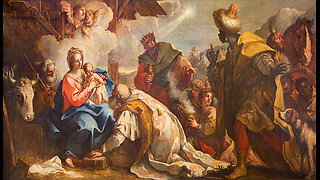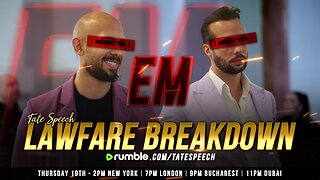Premium Only Content

Episode 2543: The Perils of Subtle Deception
The Perils of Subtle Deception:
A Reflection on the Modern Church
Good morning, everyone. Before we begin today, I ask you all to join me in praying for the victims of Hurricane Helene. The devastation unfolding across Florida and Georgia is beyond words. We are witnessing immense suffering, and our brothers and sisters in the path of this hurricane need our spiritual support now more than ever.
Opening Prayer:
In the name of the Father, and of the Son, and of the Holy Spirit. Amen.
Heavenly Father, we thank You for the gift of faith and the guidance of Your Church. We ask for wisdom and clarity as we reflect on the challenges facing our world and our Church today.
We lift up to You all those suffering from Hurricane Helene. Comfort and protect them in their time of need.
Guide our words and hearts today, and may everything we do bring glory to You.
We ask this through Christ, Our Lord. Amen.
In the name of the Father, and of the Son, and of the Holy Spirit. Amen.
Today's episode may seem unusual, but it's a topic that has weighed heavily on my heart for weeks. It was prompted by an article that was written in InfoVaticana, where a journalist posed a shocking question to one of the famous AI programs specifically, ChatGPT: "What would it look like if a pope were controlled by Satan?" This is an eerie and unsettling topic, but given the times we’re living in, it's crucial to engage deeply with the challenges we’re witnessing within the Church today.
While the idea may seem far-fetched, it leads us to profound questions about the state of our Church and whether subtle deception could be at play, leading to confusion among the faithful. Today, we will delve into these ideas, drawing on the wisdom of great saints, popes, and Catholic thinkers who foresaw many of the challenges we are now facing.
Doctrinal Confusion and Gradualism
The first tactic described in the article involves doctrinal confusion messages from the Pope that are ambiguous, conflicting, or open to multiple interpretations. This is perhaps the most dangerous strategy, as it undermines the very clarity of the Church’s teachings. Consider this: when St. Paul wrote to the Corinthians, he warned them about the dangers of confusion in doctrine, saying:
"For God is not the author of confusion, but of peace." (1 Corinthians 14:33)
In our time, we have seen a rise in ambiguity, especially concerning moral issues such as marriage, family, and human dignity. Amoris Laetitia, with its confusing footnotes on whether the divorced and civilly remarried may receive communion, is one such example. We now live in a world where, depending on the diocese, Catholics can receive contradictory teachings, further fracturing the unity of the Church.
The great St. Athanasius fought against the heresy of Arianism, which denied the divinity of Christ. He stood firm in the face of tremendous opposition. His words offer us a blueprint for how to combat this kind of confusion:
"Even if Catholics faithful to Tradition are reduced to a handful, they are the true Church of Jesus Christ."
Clarity in doctrine has always been the bedrock of the Church. But today, in the name of dialogue, unity, or mercy, we see doctrine diluted. As St. Vincent of Lérins wisely noted in the Commonitorium:
"The Church should hold fast to that which has been believed everywhere, always, and by all."
This principle of universality is now under attack by doctrines that seem to shift with every papal interview or document.
Decentralization and Synodality
Another tactic mentioned is the decentralization of papal power. Historically, the Pope has been a symbol of unity and authority for the entire Church. But recent developments, such as synodality, have given rise to local bishops' conferences holding more authority on doctrinal and pastoral issues. This threatens to fracture the Church into a collection of regional sects, each with its own interpretation of Catholic teaching.
Pope Leo XIII, in his encyclical Satis Cognitum (On the Unity of the Church), made it clear that such a decentralized model would destroy the Church’s unity:
"The Church of Christ is one and the same forever... it cannot be split into parts, or divided into sections... for to it applies the saying of Paul: 'There is one Lord, one faith, one baptism.'" (Satis Cognitum, 1896)
Synodality, while framed as a means of listening to the people, can be weaponized as a tool to dismantle papal authority, leading to contradictions in teaching and practice. As Catholics, we must be wary of these shifts and remain steadfast in the eternal truths of the faith.
Secularism and False Ecumenism
The AI also predicted that a pope under Satan’s influence would embrace excessive openness to the secular world, diluting Church doctrine to appease modern trends. We’ve seen this manifested in the Church’s increasing alignment with secular organizations and ideologies.
John Paul II, in his landmark encyclical Veritatis Splendor (The Splendor of Truth), warned us about the dangers of compromising on truth:
"There can be no true freedom apart from or in opposition to the truth." (Veritatis Splendor, 1993)
Today, we see growing trends toward "ecumenism" that sometimes border on indifferentism where all religions are treated as equally valid paths to salvation. But how does this align with Christ's declaration in the Gospel of John:
"I am the way, the truth, and the life. No one comes to the Father except through me." (John 14:6)
This kind of false ecumenism not only dilutes the Church’s identity but undermines the very mission Christ gave to His Apostles
"Go therefore and make disciples of all nations." (Matthew 28:19)
We must resist these temptations to blend into the secular world and remain vigilant in preserving the sacredness of our faith.
Scandals and Silence
One of the final strategies mentioned is a pope who tolerates scandals or is negligent in addressing corruption. St. Catherine of Siena, a Doctor of the Church, fiercely rebuked popes of her day for their failures in leadership. She famously declared:
"We've had enough of exhortations to be silent! Cry out with a thousand tongues I see the world is rotten because of silence!" (Dialogue of St. Catherine of Siena)
Her words echo through the ages, reminding us that it is often the silence of good men that allows evil to flourish. We must not remain silent in the face of scandals and corruption, even when it seems that those in power are content to look the other way. As laypeople, we are called to hold our shepherds accountable, always in charity but with unwavering resolve.
Recent events underscore this need for vigilance. In France, two historic churches, Saint Pierre Le Vieux and Saint Jean, were defiled with solid human waste. This desecration is part of a disturbing rise in violent and sacrilegious attacks against Catholic institutions in Europe. Similarly, in the United States, we have seen statues defaced, tabernacles desecrated, and even the contents of tabernacles stolen. These acts are clear signs of increasing hostility toward Christianity.
Followers of Satan, whether consciously worshipping evil or merely mocking the faith, are becoming bolder, attacking openly as if no longer feeling the need to hide their intentions. Whether they admit it or not, those acting under the guise of these attacks are fulfilling the work of Satan.
Interreligious Dialogue and False Unity
A particular strain of this hostility comes from those with whom Pope Francis seeks to form interreligious dialogue, often asserting that we worship the same God. But let me be clear: we do not. These other religions deny the Trinity, the divinity of Christ, and His redemptive sacrifice on the cross. To claim that we share the same God is, by definition, a fallacy. These false teachings only embolden the secular world and various groups to further their attacks on the Church and the faith.
In a conversation with a friend, someone expressed confusion over how Pope Francis, a man of his age, could be promoting what they perceive as evil without realizing he will soon stand in judgment before our Lord. I reminded them, as I have many times before, that modernists are true believers in their own errors. They believe that the Church has been wrong since antiquity and that it is their divine mission to correct these perceived errors.
This mentality mirrors the Protestant errors of the past, such as the Babylonian captivity theory, which claims that the Catholic Church was the true Church but defected from the faith early on. Modernists believe that Vatican II or their interpretation of it was their moment to "fix" what they view as centuries of error.
The Swiss Tragedy and Moral Degradation
As we continue to observe such blatant assaults on Christianity, an unsettling story emerges from Switzerland, where the lines between human rights and moral degradation blur. A self-destruction capsule, once a dark joke on a futuristic cartoon like Futurama, has now become a real-world tool of despair. Recently, a 64-year-old American woman used one of these capsules to end her life, bypassing the safeguards that would otherwise lead her to proper palliative care.
In response, Swiss Bishop Felix Murr rightly condemned the capsule, calling it dangerous and advocating for humane, holistic care. However, his statement, though morally sound, lacked the central component of our faith Christ. No mention was made of the gravity of the sin committed, nor of the hope found in salvation through our Lord. This omission reflects the slow secularization of moral teaching within the Church itself.
This Swiss tragedy, combined with the desecration of churches in France, showcases how deeply secular and modernist ideologies have infiltrated not just the world, but the Church. The faithful are being led astray by leaders who, while well-intentioned in their desire to modernize, have succumbed to the error that the Church must be "fixed" to suit the secular world. This mentality has been present for decades but has accelerated under the current papacy, where even a pope like Francis, who may not overtly promote evil, indirectly furthers its cause by his compromises with modernism.
Modernist Errors and Cultural Degradation
As I have discussed in my podcasts, modernists believe that they are divinely called to correct the Church’s so-called "rigidity" that, according to them, has plagued it since antiquity. They see themselves as reformers, likening their mission to that of St. Francis of Assisi, though they grossly misunderstand his true mission. Instead, they share beliefs similar to certain Protestant errors, such as the Babylonian captivity theory, which claims the Catholic Church was the true Church but defected from the faith early on.
These modernists believe that Vatican II or their interpretation of it was their moment to "fix" what they view as centuries of error. But this way of thinking turns Christ’s promise to Peter—that the gates of Hell will not prevail against the Church into a lie. We know this cannot be true, yet modernist bishops and clergy, empowered by a "destroyer pope," are pushing the Church into greater alignment with secular, humanistic values. They speak endlessly about the "rights of man" but remain silent on the rights and duties we owe to God.
What we are witnessing is a collapse of moral authority in the Church. Bishops are afraid to preach on sin, much less on the four last things death, judgment, Heaven, and Hell. Many parishes today rarely, if ever, address these truths from the pulpit, which would explain why so many Catholics live as practical atheists. They no longer see sin or death as matters of ultimate consequence. The cultural degradation we’re seeing, from Switzerland’s assisted suicide to the desecration of French churches, is a direct result of this moral and spiritual collapse.
Conclusion: The Importance of Vigilance
In summary, the hypothetical scenario presented by this AI is not so hypothetical after all. We are living through a time of doctrinal confusion, secular infiltration, and scandals that shake the foundations of our faith. But remember the words of Our Lord:
"And I say to you that you are Peter, and upon this rock I will build my church; and the gates of hell shall not prevail against it." (Matthew 16:18)
The Church will endure, but it is up to us to stand firm in the truth. As St. Pius X warned in Pascendi Dominici Gregis (On the Doctrines of the Modernists), modernism is a synthesis of all heresies. It thrives on ambiguity and gradual deviation from truth.
Let us take to heart the words of the great saints and theologians of our past. We must remain vigilant, speak boldly in defense of the faith, and pray fervently for our Holy Mother Church. As St. Paul exhorted the Ephesians:
"Put on the full armor of God, so that you can take your stand against the devil’s schemes." (Ephesians 6:11)
The recent desecrations of Saint Pierre Le Vieux and Saint Jean churches in France, alongside the wave of church vandalizations and thefts across the United States, are tangible signs of increasing hostility toward Christianity. These acts of violence and sacrilege are clear indicators of a rising tide of secularism and Satanic influence seeking to undermine the Church.
Moreover, the story from Switzerland about the self-destruction capsule highlights the moral degradation infiltrating our society and, alarmingly, our Church. While Swiss Bishop Felix Murr condemned the capsule and advocated for humane care, his statement lacked the essential acknowledgment of sin and the hope of salvation through Christ. This omission is a reflection of the gradual secularization within the Church, where moral teachings are being softened or ignored to align with modernist ideologies.
As Catholics, we must recognize that these attacks are not merely random acts of vandalism or isolated incidents of moral failure. They are part of a larger, more sinister strategy to erode the foundations of our faith through subtle deception and gradualism. The modernists, convinced of their divine mandate to "fix" the Church, are leading it astray, compromising essential doctrines, and fostering division among the faithful.
Our duty is clear: we must stay vigilant. The assault on our faith is no longer covert—it is out in the open. We are called to stand firm, proclaim the truth, and remember our duty to God above all else. Let us heed the warnings of our saints, adhere to the timeless teachings of the Church, and pray for the strength to resist the subtle deceptions that seek to lead us away from the truth.
Thank you for joining me today. Stay strong in the faith, and until next time, may God bless you, and may Our Lady protect you under her mantle.
Closing Prayer
Let us close with a prayer for the victims of Hurricane Helene and for the Church:
"O God, our refuge and strength, be with those suffering from the hurricane. Protect them and bring them comfort in their time of need. We also ask for Your grace to strengthen the Church in these troubling times. May the Holy Spirit guide our leaders to the truth and preserve the unity of Your Holy Church. Through Christ our Lord. Amen."
-
 LIVE
LIVE
LFA TV
23 hours agoBible Prophecy Was Center Stage in 2024 | Trumpet Daily 12.19.24 7PM EST
550 watching -
 LIVE
LIVE
Quite Frankly
6 hours ago"Divine Providence & The Three Wisemen" ft. Fr. Jason Charron 12/19/24
927 watching -
 1:58:28
1:58:28
Redacted News
5 hours agoBREAKING! Elon Musk DESTROYS spending bill, Ron Paul pushes to make him Speaker | Redacted News
118K253 -
 51:06
51:06
VSiNLive
3 hours agoCollege Football Playoff & Bowl Game Best Bets! | VSiN College Football Betting Podcast LIVE
28.1K1 -
 1:34:33
1:34:33
Candace Show Podcast
4 hours agoHow We Faked The Moon Landing With Bart Sibrel | Candace Ep 124
53.5K199 -
 2:08:47
2:08:47
Scammer Payback
3 hours agoCalling Scammers Live
19.9K4 -
 1:01:07
1:01:07
In The Litter Box w/ Jewels & Catturd
1 day agoVOX POPULI, VOX DEI | In the Litter Box w/ Jewels & Catturd – Ep. 709 – 12/19/2024
86.5K38 -
 22:54
22:54
Stephen Gardner
5 hours ago🔥JUST NOW: Trump JUST SHOCKED GOP with new DEMAND!!
60.3K57 -
 1:23:22
1:23:22
Tate Speech by Andrew Tate
6 hours agoEMERGENCY MEETING EPISODE 96 - LAWFARE BREAKDOWN
191K184 -
 16:53
16:53
DeVory Darkins
1 day ago $15.74 earnedElon Musk Drops NIGHTMARE WARNING on Congress
47.3K217